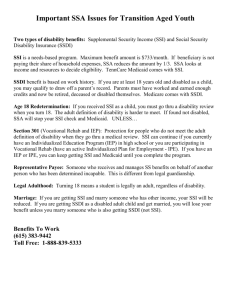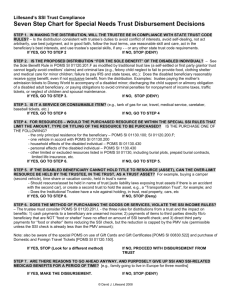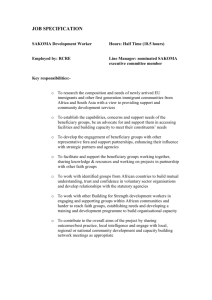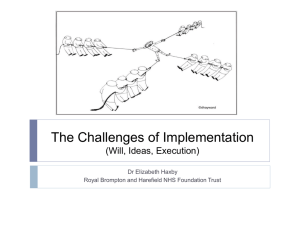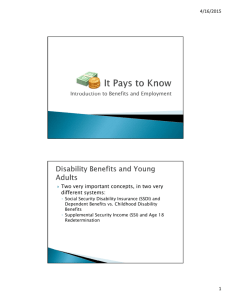Basics of Special Needs Planning
advertisement
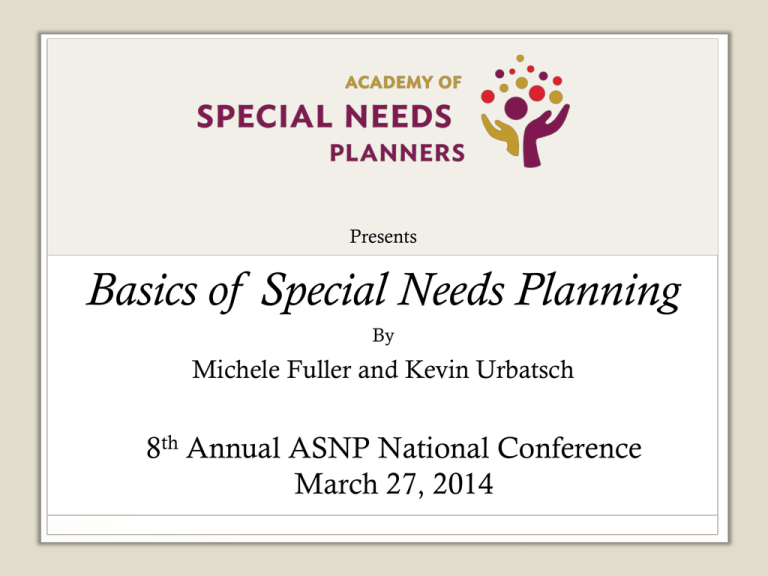
Presents Basics of Special Needs Planning By Michele Fuller and Kevin Urbatsch 8th Annual ASNP National Conference March 27, 2014 Morning Agenda Overview of Special Needs Planning Working with Persons with Disabilities and their Families Basics of Public Benefits for Persons with Disabilities (SSI, Medicaid, SSDI, Medicare) Different Types of SNTs (Third Party SNTs, (d)(4)(A) SNT, Pooled SNT) Avoiding Common Mistakes During Special Needs Planning and Administration Benefits of Planning 1. Provide Financial Security 5. Provide Ongoing System for Advocacy 2. Leverage Means Tested Public Benefits 6. Plan for Caregiving Needs 3. Select Proper Team to Provide Lifetime Management 7. Coordinate Entire Extended Family's Planning 8. Protect Beneficiary from Predators 4. Plan for Appropriate Housing 9. Preserve Assets for other Heirs 3 Number of Persons with Disabilities •Dramatic rise over next 30 years •Aging baby boomer generation •Combat related disabilities •New category: voluntary disability? •Autism •Aging with disabilities • The Future of Planning for Persons with Special Needs: What Challenges Will Arise, NAELA Journal Vol 9, No. 2, Fall 2013, by Kevin Urbatsch and Michele Fuller Number of Persons with Disabilities • Currently 1:7 currently disabled • Aging baby boomers • Population over 65 predicted to double by 2030 • However, number of aged with disabilities dropping due to medical advances • Largest increase: those under 65 • Asthma • Autism • Childhood obesity Do All Persons with Disabilities Require Special Planning? Only those individuals who meet the definition of disability and must maintain eligibility for needs-based programs require planning • SSI & Medicaid • NOT SSDI & Medicare Working with People with Disabilities • Common Issue: not including the person with a disability in the planning • Capacity issues • Often relies on others (Family, Friends and Community) • Can be difficult, especially with severe mental illness – patience and a thick skin are a must • Remember People First Language Working with the Family • Research the condition so you can address the issues that arise (e.g. Prader-Willi Syndrome – Issues w/food) • Making sure the decision-maker is in room • Understand and be able to discuss the acronyms (IEP, SSI, SNT) • Being able to provide referrals to applicable resources like charities or support groups Public Benefits Summary Types of Public Benefit Programs Needs Based Public Benefits Entitlement Public Benefits Other Benefit Programs SSI SSDI Section 8 Medicaid Medicare Veteran Benefits Expanded Medicaid What SSI Provides SSI provides a monthly cash grant for food and shelter to disabled, blind, or the aged (65 or older) Some States supplement this amount. (e.g., In 2014, the SSI federal maximum payment is California provides a $156.40/month $721 for an individual supplement in 2014 Where is SSI Law? Finding the Law, Regulations, and SSA Policy • 42 U.S.C. §§1381–1383f • 20 C.F.R. §§416.101–416.2227 • SSA’s Program Operations Manual System (POMS) governs administration of SSI. POMS guidelines are available on the SSA’s website at • http://policy.ssa.gov/poms.nsf SSI Non-Financial Requirements • Citizen or lawful resident • Not be a fugitive felon, in prison, violating parole • Not be outside the U.S. for more than one month • Must apply for all other benefits for which you are eligible • If an alien, meet special requirements SSI Eligibility Person Must Meet Two Additional Tests: • Medically Disabled (physically or mentally) under SSI’s Definition or Elderly (65+), plus • Poor • Resource Test – measured only one time each month • Income Test – total any income received any time of the month Disability Defined • “Disability” for an adult is defined as the inability to engage in any “substantial gainful activity” (SGA) due to any medically determinable physical or mental impairment, or combination of impairments, that has lasted or can be expected to last for a continuous period of at least 12 months, or result in death • “Disability” for a minor is defined as a medically determinable physical or mental impairment or combination of impairments that causes marked and severe functional limitations, and that can be expected to cause death or that has lasted or can be expected to last for a continuous period of not less than 12 months SSI Resource Test “Countable resource” limits for SSI: • $2,000 for an eligible individual • $3,000 for an eligible couple • Measured on a month-by-month basis on first day of each month • Snapshot Test SSI BIG Exempt Assets • Principal residence • (20 CFR §416.1212) • Automobile (of any value) • (20 CFR §§416.1210(c)) SSI Other Exempt Assets • Household items (20 CFR §§416.1210(b), 416.1216(a); • Personal effects (20 CFR §§416.1210(b), 416.1216(b)); • Musical instruments (20 CFR §§416.1210(b), 416.1216(b)); • Burial insurance (20 CFR §§416.1230, 416.1231(b)(8)); • Irrevocable burial trusts; burial funds (20 CFR §416.1230, 416.1231(b)(8)); • Burial plots, vaults, and crypts (20 CFR §416.1231(a)); and • Life insurance policies with cash value less than $1500, All term life insurance (20 CFR §416.1230) 19 Types of SSI Income Unearned Income Earned Income Consists of wages, royalties, net earnings from self employment, and any honoraria received for services rendered. Includes gifts, payments from annuities, and pensions, alimony and support payments, dividends, interest, rents, awards and payments from other benefits programs. Reduces benefits one dollar for every two dollars earned after the first $65 earned monthly. Reduces benefits dollar-for-dollar after the first $20.00 20 Types of SSI Income In-Kind Support & Maintenance Deemed Income Actual receipt of food, clothing, or shelter, or something that can be used to get one of these. Someone else’s income. (Same household; duty to support) Reduces benefits dollar for dollar up to a maximum of 1/3 the benefit. Reduces benefits dollar-for-dollar after the first $20.00 21 SSI Exempt Income and Earned Income The first $20 of any income is exempt plus the first $65 of earned income Earned income after the first $85 reduces the SSI monthly benefit: • $1 for every $2 earned • Example: If $585 was earned in a month, the SSI check would be reduced by $250 • ($585-$85 exemptions – 250 (50% of remaining earned income) = $250 SSI Unearned Income Unearned income reduces the SSI monthly cash payment dollar-for-dollar, after taking the $20 "anyincome" exemption The effect of Unearned Income is much greater than Earned Income • Example: Parent gives child SSI recipient $585 cash gift. Child will lose $565 of his monthly SSI check SSI In-Kind Support and Maintenance (ISM) Depending on living arrangements, SSI reduction is subject to either the • Value of the one-third reduction (VTR) or • Presumed maximum value rule (PMV) • Clothing used to be considered ISM but no longer is, see POMS SI 00835.400 ISM Defined The only ten “food and shelter” items are: 1. 2. 3. 4. 5. 6. 7. 8. 9. 10. Food Mortgage (including property ins. required by lender) Real property taxes (less any tax rebate/credit) Rent Heating fuel Gas Electricity Water Sewer Garbage removal SSI Deeming of Income to Minor or Spouse Income and resources of a person having a duty of support are attributed or "deemed" to the person who is legally entitled to support. In the most common cases: • Parents income and assets deemed to minor • Spouse’s income and assets deemed to spouse “Deeming” is an irrefutable presumption: It does not matter if money is actually provided to an eligible individual for deeming to apply. SSI Penalty for Giving Away Assets Individuals who give away assets are ineligible for SSI for up to 36 months To calculate the period of ineligibility, the amount transferred is divided by the transferor's monthly SSI benefit (including state supplement), rounding the result up or down to the nearest whole number • Example: Eric receives $674/month from SSI. He receives $20,000 from his mother. He gives the entire amount to his brother. Eric loses 29 months of SSI eligibility (20,000 ÷ 674 = 29.67 or, rounded down, 29 months. SSI Reporting Requirement Benefits recipients are under a legal obligation to notify the SSA of changed circumstances, e.g., a change in income or assets. The report should be in writing and mailed by certified letter within 10 calendar days of the end of the month in which the assets were received to the local SSA office. Reports should include: • The reporter's name; • The name and Social Security number (SSN) of the person the report is about; • Facts about the change; and • When the change happened Eligibility for Medicaid 1634 States • Alabama, Arizona, Arkansas, California, Colorado, Delaware, Georgia, Florida, Kentucky, Iowa, Louisiana, Maine, Maryland, Massachusetts, Michigan, Mississippi, Montana, New Jersey, New Mexico, New York, North Carolina, Pennsylvania, Rhode Island, South Carolina, South Dakota, Tennessee, Texas, Vermont, Washington, West Virginia, Wisconsin, Wyoming and Washington, D.C. SSI Criteria States • Alaska, Idaho, Kansas, Nebraska, Oregon, and Utah 209b States • Connecticut, Hawaii, Illinois, Indiana, Minnesota, Missouri, New Hampshire, North Dakota, Ohio, Oklahoma, and Virginia Eligibility for Medicaid •1634 States ▫ SSI rules apply and $1 of SSI eligibility means automatic Medicaid eligibility •SSI Criteria States ▫ States elect to provide Medicaid for all SSI recipients, but only if the recipient completes a separate application for Medicaid Program •209b States ▫ Most restrictive allows States to authorize Medicaid criteria which are more restrictive than SSI criteria, so long as criteria chosen are not more restrictive than the State's approved Medicaid plan in Jan. 1972 ACA (Private Insurance) Expanded Medicaid • ACA – Private Health Insurance • Government Subsidized Private Health Care for Income Levels of 139 to 400% of Federal Poverty Limit • Ends at Age 65 • May Not Provide Full Coverage • Expanded Medicaid • Free Medicaid without Asset Test – Less Than 138% of FPL • Ends at Age 65 • Not Every State Has Adopted It 31 Social Security Disability Insurance (SSDI) Basic Eligibility Criteria 40 SSA work credits, 20 of which must have been earned in the last 10 years Number of credits required is based on age, and when the individual becomes disabled. In 2014, an individual gains 1 credit for each $1,200 of wages. Therefore, earnings of $4,800 equal 4 credits Paid Social Security taxes on earnings After Two Years – Qualify for Medicare Social Security – Childhood Disability Beneficiary • The SSDI program pays benefits to adults whose disability began before the age of 22 • This program is currently called the Childhood Disability Beneficiary (CDB), formerly referred to as a Disabled Adult Child (DAC) • The amount of the monthly check is roughly • 50 percent of the parent's monthly cash payment at retirement, and • 75 percent at death. Medicare Basics Part A – Hospital Insurance • Covers most of a stay in the hospital, plus some follow-up costs Part B – Medical Insurance • Covers some of the costs of doctors and outpatient care Part D – Prescription Drugs • Pays some of the cost of prescription drugs 34 Different Types of Special Needs Trusts Types of Special Needs Trusts Source of Funds Who Establishes Trustee Third Party Anyone except beneficiary Anyone except beneficiary Grantor’s wishes Grantor’s wishes Third Party Pooled Trust Anyone except beneficiary Anyone except beneficiary Non-profit Grantor’s wishes First Party (d)(4)(A) Beneficiary with a disability’s funds before age 65 Parent, Grandparent, Guardian, Court Grantor’s wishes Medicaid payback; then remainder beneficiaries First Party (d)(4)(C) Pooled Trust Beneficiary with a disability’s funds – may be funding penalty after age 65 Beneficiary, Parent, Grandparent, Guardian, Court Non-profit Non-profit Trustee; or, Medicaid payback; then remainder beneficiaries 36 Distribution Upon Death Third-Party Special Needs Trust Third-party trust main requirements: • Beneficiary (or spouse) did not create the trust • Trust does not hold Beneficiary’s (or spouse’s) assets • Beneficiary is not Trustee • Trustee has sufficient discretion to withhold distributions Third-Party SNT Requirements For SSI purposes, SSA defines a third party trust as "a trust established by someone other than the beneficiary as grantor.“ It defines a grantor as "the individual who provides the trust principal (or corpus).” Third Party SNT Requirements POMS two additional requirements: 1. Beneficiary cannot have authority to revoke the trust; and 2. Beneficiary cannot direct the use of trust assets for his or her support and maintenance under the terms of the trust Third-Party SNTs • No payback requirements • Grantor can leave any remaining funds to whomever he or she wants • Revocable during life of grantor • If for a spouse, must be established by will (not revocable trust) • More drafting flexibility so long as correct distribution standard is used First-Party Special Needs Trusts Disabled individual’s own funds are placed into the trust. Established by statute: • (d)(4)(A) – Payback Trust • (d)(4)(C) – Pooled Trust First Party SNTs When are First Party SNTs used: • Personal Injury Award • Inheritance or Gift • Minor with a Disability Turns 18 • Adult Recently Disabled (d)(4)(A) SNT Requirements Authorized by 42 U.S.C. §1396p(d)(4)(A) and has the following characteristics: • Irrevocable • Established by parent, grandparent, legal guardian, or court • For the sole benefit of a person with a disability who is under the age of 65 • Provide that on the death of the beneficiary, the trustee must repay Medicaid for all benefits received by the beneficiary during his or her lifetime to the extent that funds remain in the trust at the beneficiary's death PRO’s - (d)(4)(A) SNT • Control • Choice of Trustee • Choice of Investment Options • More easily accepting of non-liquid assets like real estate • More personalized attention CON’s - (d)(4)(A) SNT Limited to under age 65 Control • Choice of Trustee may be inappropriate • Investments could be too aggressive; result in a loss of principal Cannot be executed by an individual with capacity • Often results in Probate Court involvement to establish trust and possible court supervision; bond • Very costly to maintain; No cap on fees Poor drafting or administration (d)(4)(C) Pooled SNT Requirements • Irrevocable • Established and managed by a non-profit association. • Separate account is maintained for each beneficiary; pooled for purposes of investment and management • Established by the individual, parent, grandparent, legal guardian, or by a court. • Residual funds after death are retained by the trust or repaid to the State for medical assistance paid on behalf of the beneficiary Typical Components Pooled Trust • Master Trust Agreement • Joinder Agreement • Information Sheet / Questionnaire • Legal Advice Waiver • Fee Notice • Funds Request Form • Account Statements (at least annually) PRO’s - Pooled Trust • Can be executed by an individual with capacity • No Court supervision required • Professional Administration • Often fees are capped • Perfect for small settlements • Choice of paying back state or leaving to charity • Easier and can be lower cost to establish CON’s – Pooled Trust • Beneficiary has little control • Fees can be large • Investment options may be limited or information may not be accessible • Not always accepting of non-liquid assets; depends on the Trustee • Distribution may be by committee or only at certain times Avoiding Common Mistakes During Special Needs Planning and Administration SNT Issues Ripe for Mistakes • Stricter Enforcement by Public Agencies • Section 8 Housing - Distributions affect benefit • Medicare Set-Aside Arrangements Failing To Keep Informed About Changes In Law Concerning SNTs • Special Needs Attorney Organization • Academy of Special Needs Planners (ASNP) • National Academy of Elder Law Attorneys (NAELA) • Nonprofit Associations Assisting Persons with Disabilities • Government Agencies Assisting Persons with Disabilities Failing To Determine Which Person The Attorney Represents Common scenarios include: • Family member brings in person with a disability who has marginal or no capacity • Personal injury attorney brings case to attorney to set up special needs trust • Attorney establishes special needs trust for PI Attorney/Beneficiary then represents trustee Confusing the Public Benefit Programs Needs-Based Public Benefits: • Supplemental Security Income (SSI) • Medicaid Entitlement Public Benefits: • Social Security Disability Income (SSDI) • Social Security – CDB • Medicare Other benefit programs • Section 8 • Veteran Benefits • SNAP • Waiver Services Confusing Different Types of SNTs First Party Special Needs Trusts • (d)(4)(A) SNT or Payback SNT • Pooled SNT or (d)(4)(C) SNT • Miller Trusts or (d)(4)(B) trust Third Party Special Needs Trust Improper Third Party Planning Improper Third Party SNT Planning • For spouse, must be done through will One Dimensional Third Party Planning (it’s not just about public benefits) • Advocacy and care giving • Multiple beneficiaries • Coordination with family members • Memorandum of intent Poor Distribution Standard • Too broad (e.g., distribution for SNT beneficiary’s support, maintenance or mandatory distribution) will reduce or eliminate needs-based public benefits • Too narrow will unnecessarily restrict trustee’s ability to make distributions (e.g., distribution that will not reduce SNT beneficiary’s public benefits in any way) Poor SNT Management Team Trustee • Bank or Private Professional Fiduciary Trust Advisory Committee • Family members and friends, may also include professional benefits counselor to make sure distributions do not interfere with public benefits Trust Protector • Modify trust for changes in law or to remove and replace trustee for any reason Not Preparing a Financial Plan Common gaps in financial planning •Premature death or disability of parent •Inadequate savings to meet lifetime goals •Not taking advantage of benefit programs •Failing to review and monitor financial plan Fails to Set Up Process for Distribution • Number One complaint is that SNT trustee fails to timely respond to distribution requests • Best practice is to require that all disbursement requests come in writing • Have form that can be scanned and emailed or faxed • Trustee needs system for accepting/denying requests Complying with “Sole Benefit Rule” • POMS require that First party SNTs be for the “sole benefit” as defined Consider a trust established for the sole benefit of an individual if the trust benefits no one but that individual, whether at the time the trust is established or at any time for the remainder of the individual's life. POMS SI 01120.201F.2.a “Sole Benefit”- But for how long? Consider the following disbursements or distributions to be for the sole benefit of the trust beneficiary: • Payments to a third party that result in the receipt of goods or services by the trust beneficiary; • Payment of third party travel expenses which are necessary in order for the trust beneficiary to obtain medical treatment; and • Payment of third party travel expenses to visit a trust beneficiary who resides in an institution, nursing home, or other long-term care facility (e.g., group homes and assisted living facilities) or other supported living arrangement in which a non-family member or entity is being paid to provide or oversee the individual’s living arrangement. The travel must be for the purpose of ensuring the safety and/or medical well-being of the individual. • POMS SI 01120.201F.2.b. Distributing Cash/ Allowance/ Gift Card To Beneficiary • Distributing more than $20 cash a month directly to beneficiary – unearned income reduces SSI (dollar for dollar) • Gift Cards okay but only if 1. cannot be used for food or shelter and 2. legal prohibition against resale Otherwise treated as unearned income, nearly impossible to meet Refusing To Make Appropriate Distributions To A SNT Beneficiary • • • • • • • • Purchase of Exempt Resources Payment of Food and Shelter Payment for Services Payment of Medical Expenses Vacations Payment of Appropriate Credit Card Charges Clothing Home Furnishings, etc. etc. etc. Not Maintaining Good Records • How long? • One SSA Agency sought 25 years of trust records • If records are inadequate all doubts and presumptions made that Trustee did something inappropriate First Party SNT Termination – Payback Provision May pay Reasonable fees for administration of trust Taxes Then must pay all State Medicaid agencies Not allowed prior to payback Funeral Expenses (prepay for funeral) Preexisting debts Thank You

